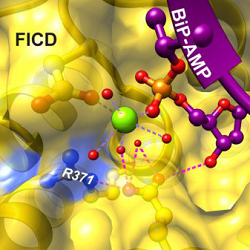
Rare cases of diabetes have been described in infants which can include other symptoms such as neurodevelopmental delay, and are monogenic in origin. A small but growing list of mutations identified in such patients result in dysregulation of endoplasmic reticulum (ER) homeostasis – to which insulin-secreting pancreatic beta cells are particularly susceptible.
The Ron lab at CIMR has a longstanding interest in ER homeostasis, including the structure and functional regulation of BiP, an ER chaperone. BiP is regulated dynamically in response to the ER environment by the reversible and opposing effects of AMPylation and de-AMPylation - with both modifications, unusually, being catalysed by the same enzyme, FICD. In a new collaborative study published in EMBO Molecular Medicine, Dr Elisa De Franco, Prof Andrew Hattersley FRS and colleagues at the University of Exeter first identified three different families with infancy-onset diabetes mellitus and severe neurodevelopmental delay caused by a newly-described homozygous mutation (R371S) in FICD. Dr Luke Perera and Dr Heather Harding from the Ron lab next analysed the impact of this mutation on FICD structure and function using recombinant proteins and cellular assays. Their data show that the disease-causing FICD R371S mutant enzyme is unable to de-AMPylate BiP, with the resultant build-up of AMPylated BiP impeding the secretory process in affected cells. The paper concludes that therapeutically blocking all FICD activity may be a worthwhile aim in patients who are homozygous for FICD(R371S).

